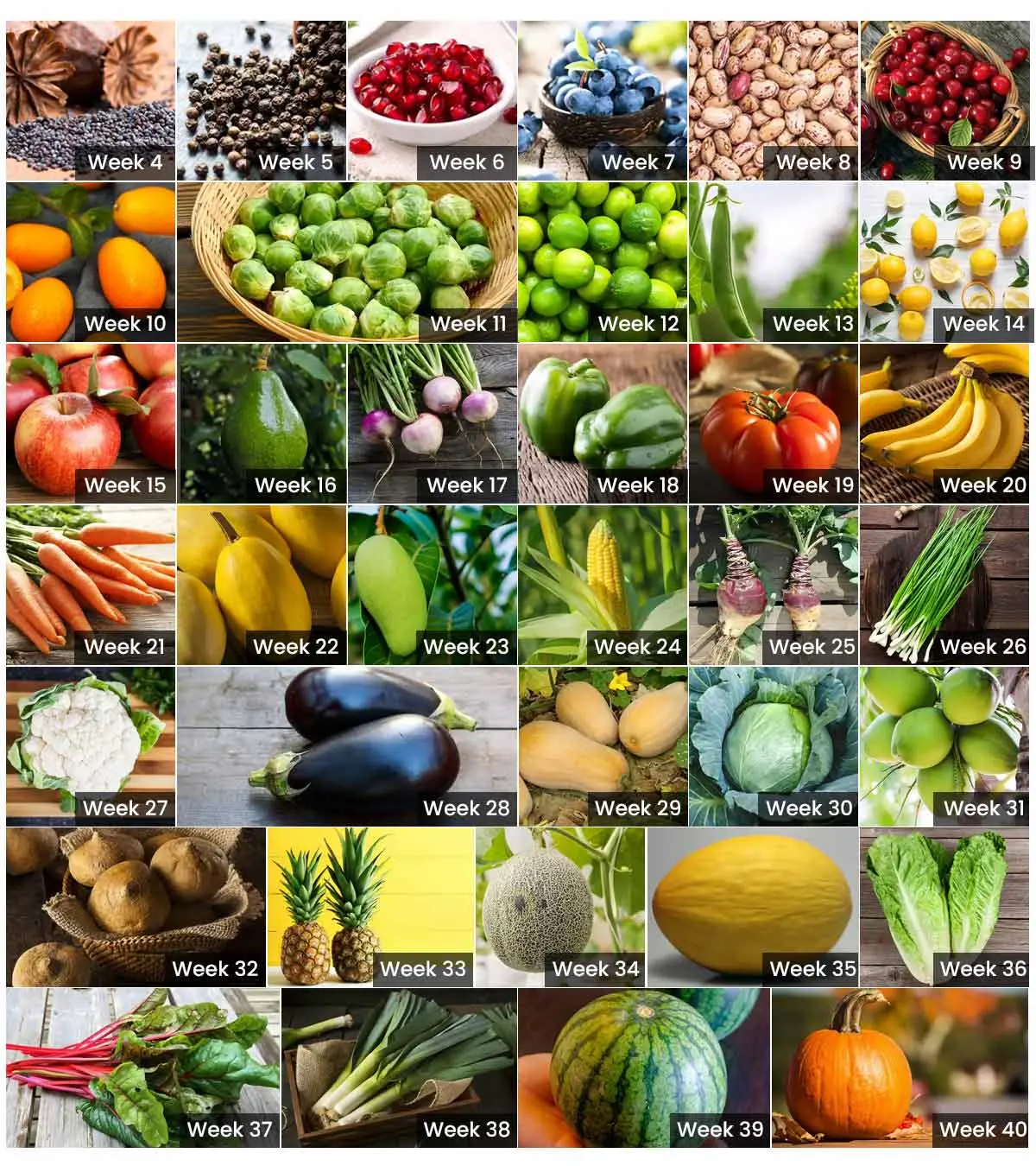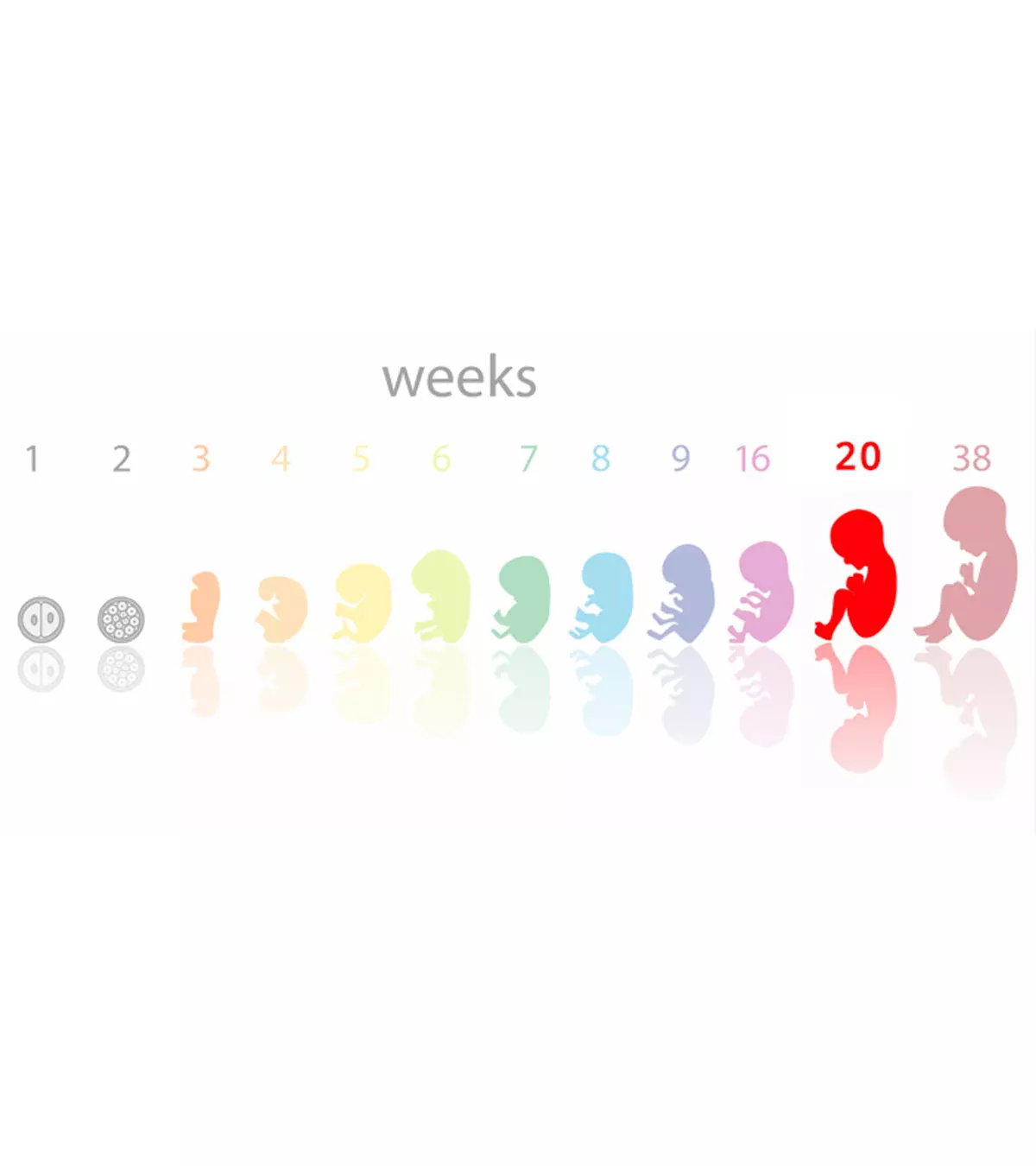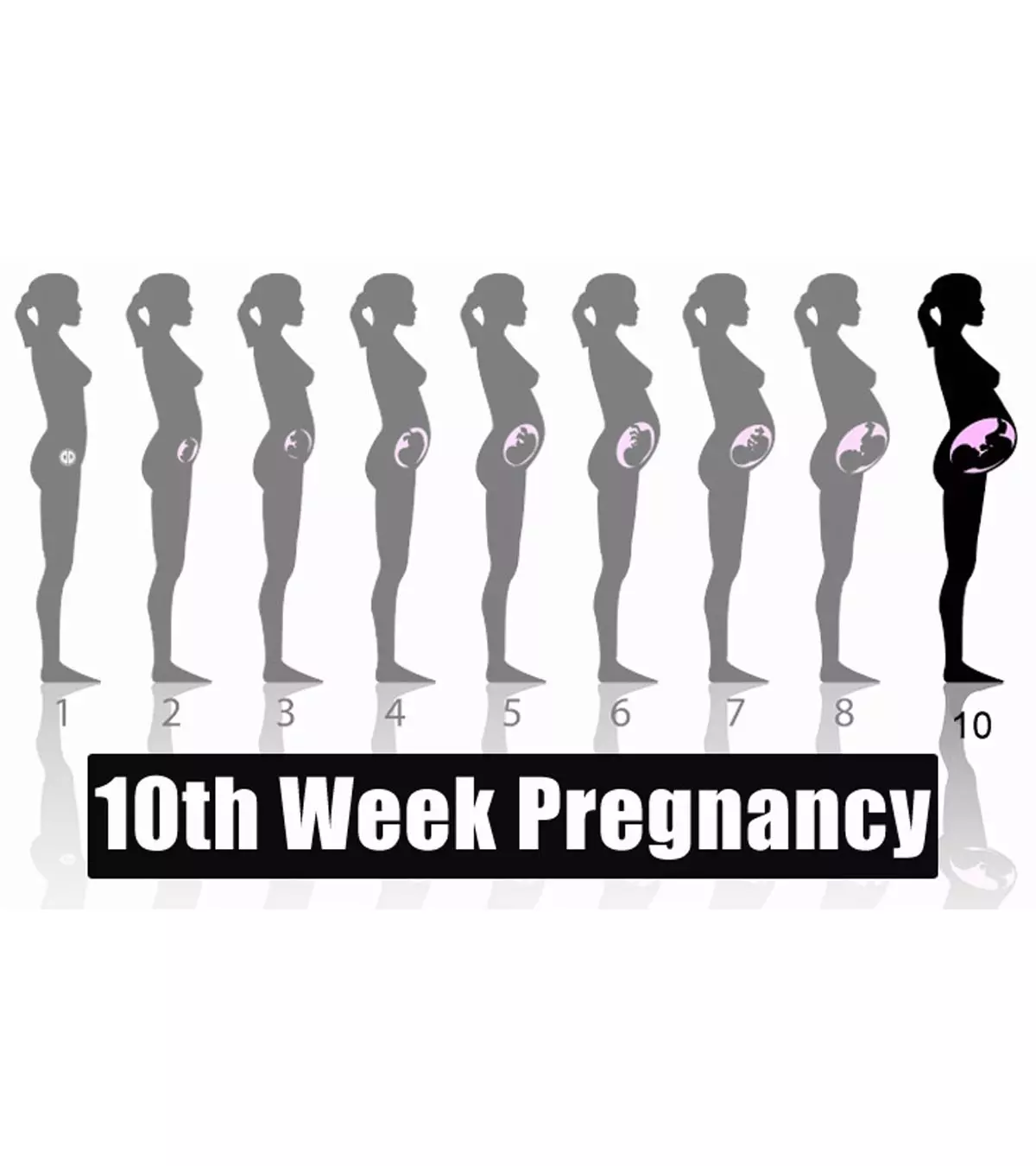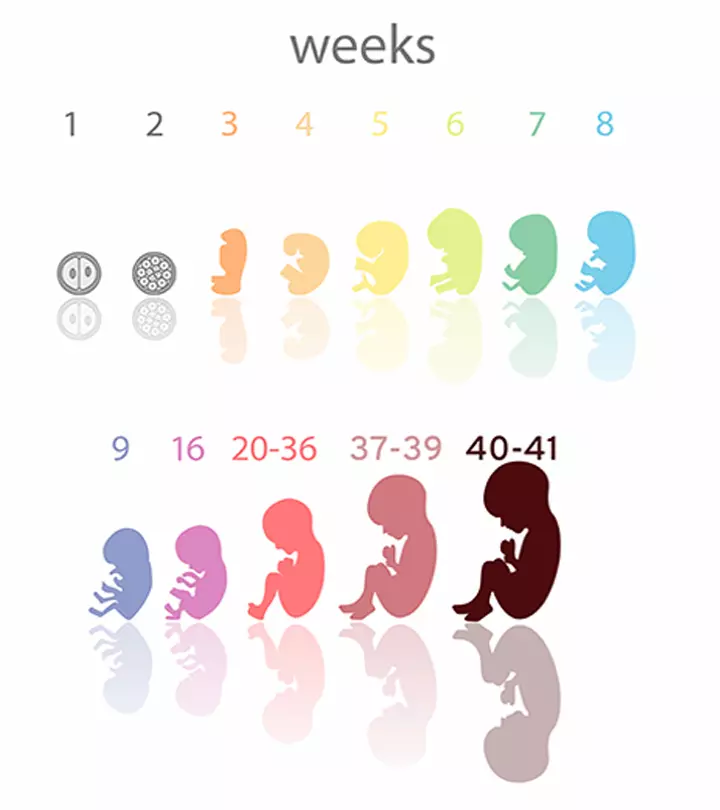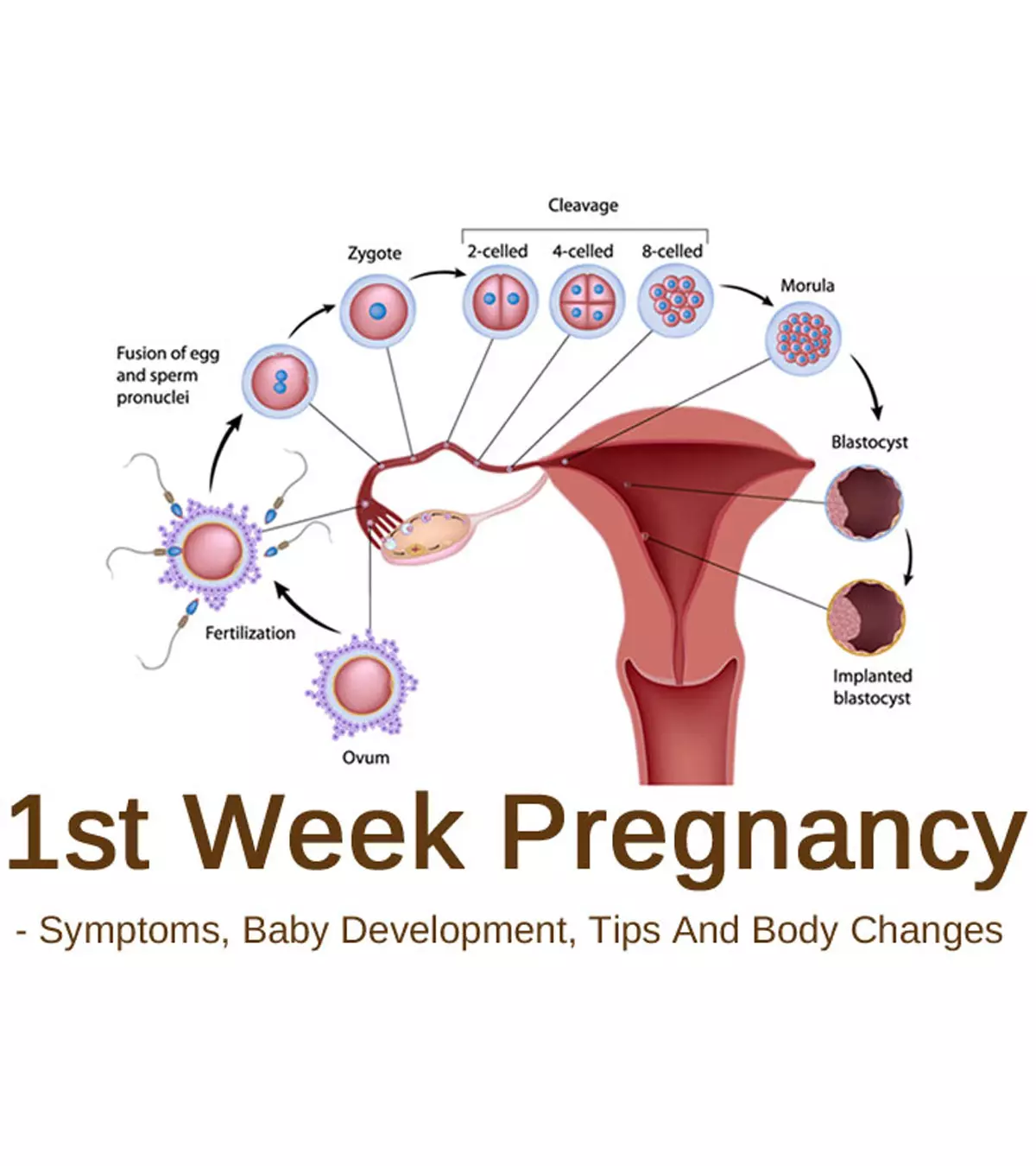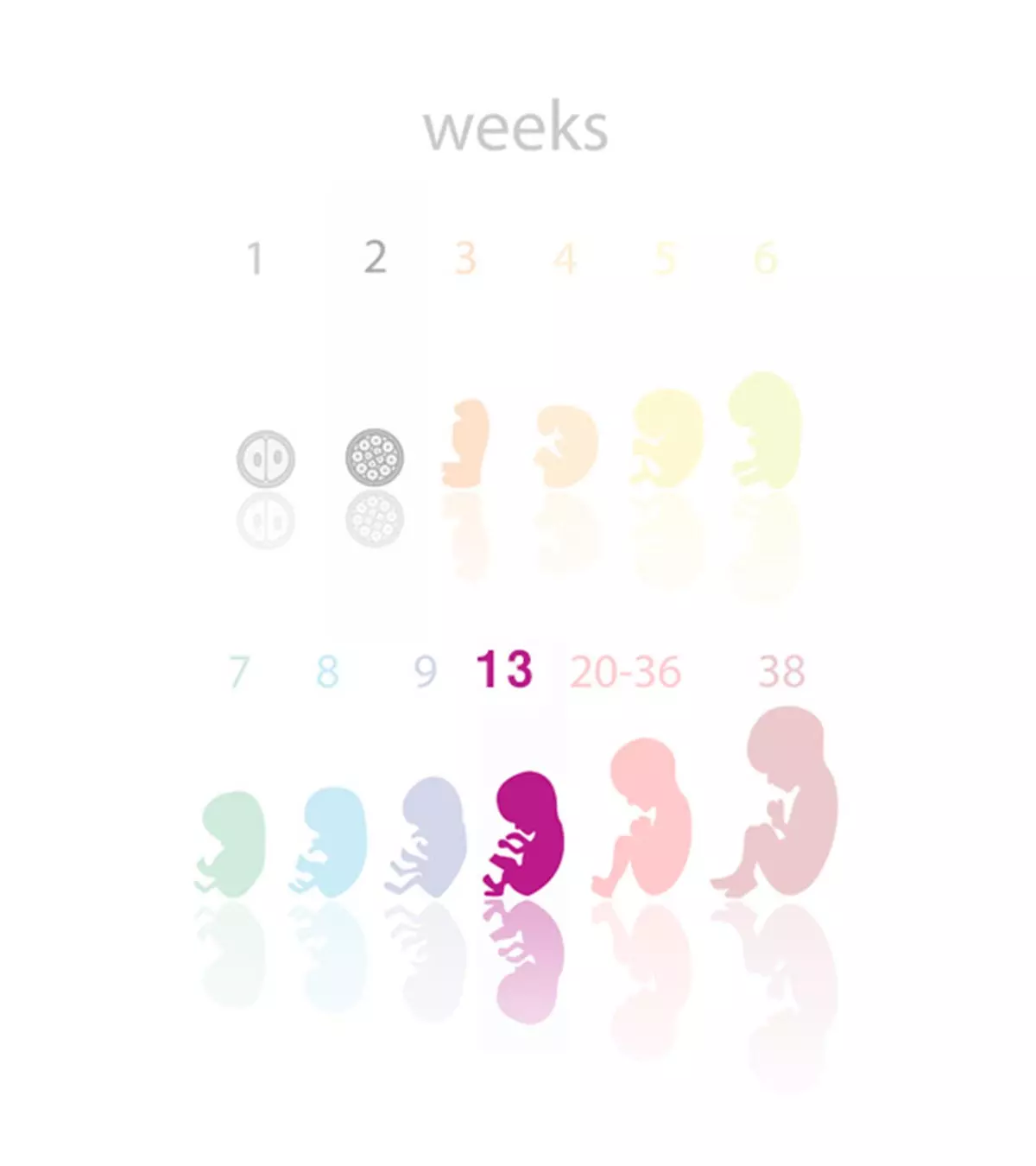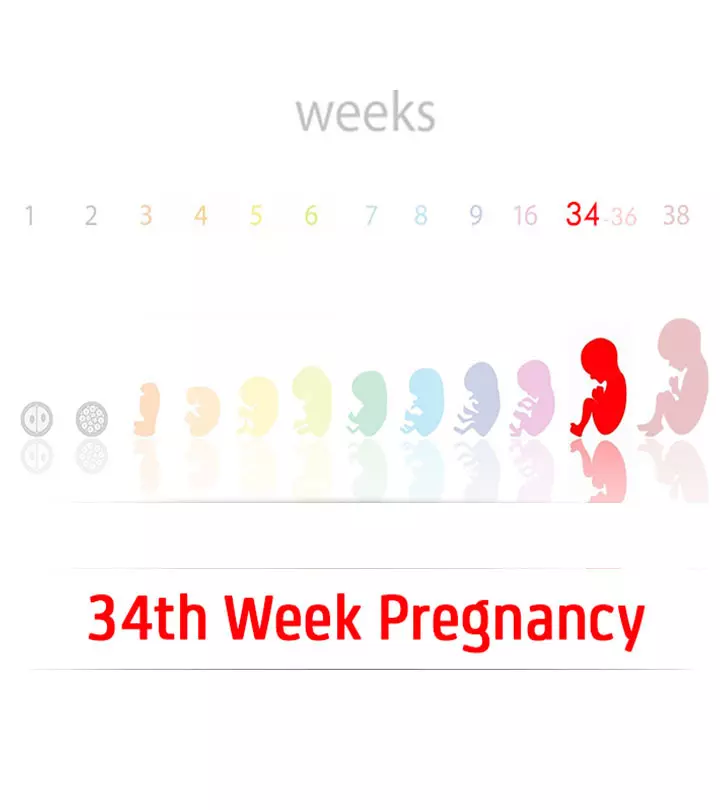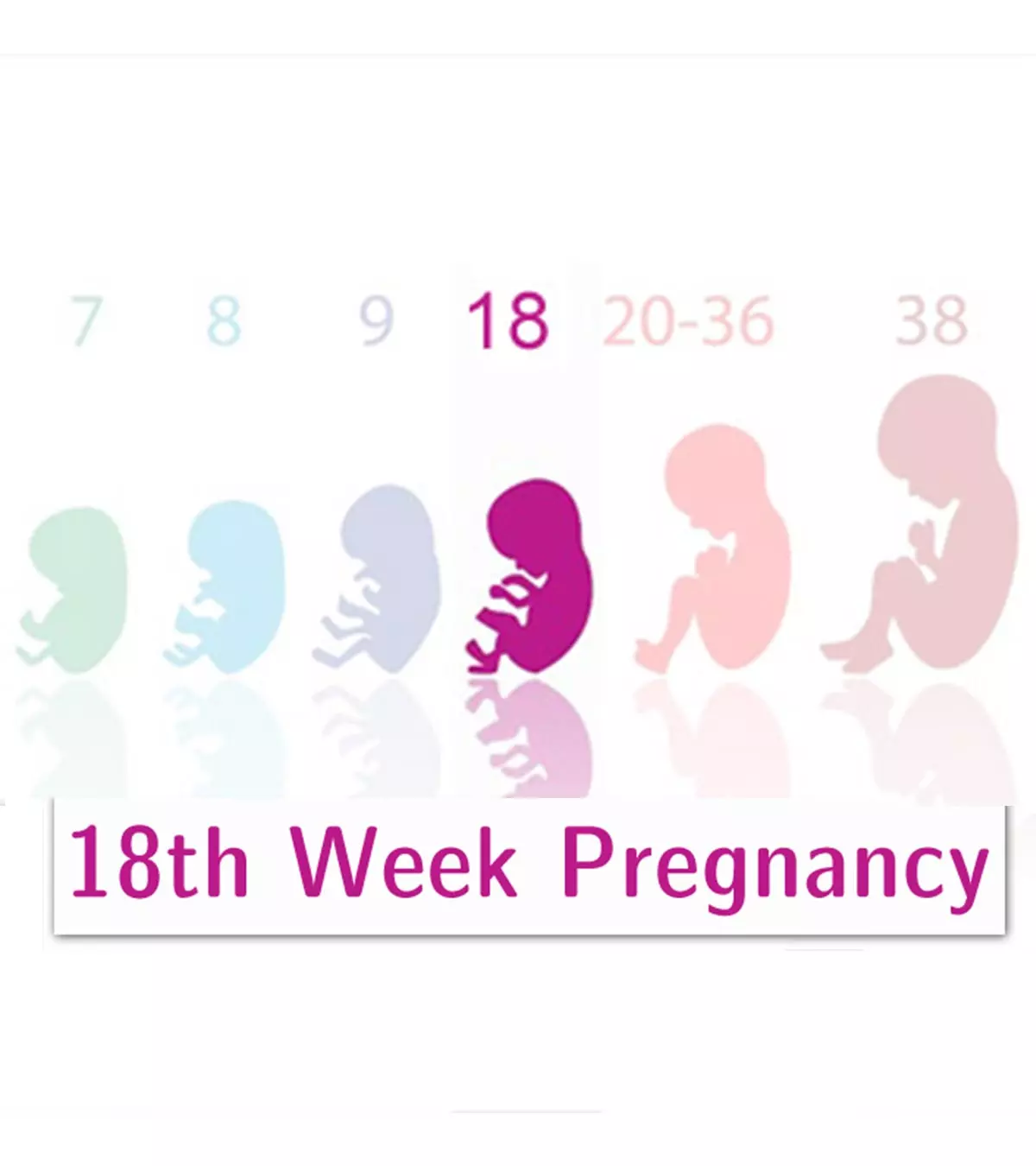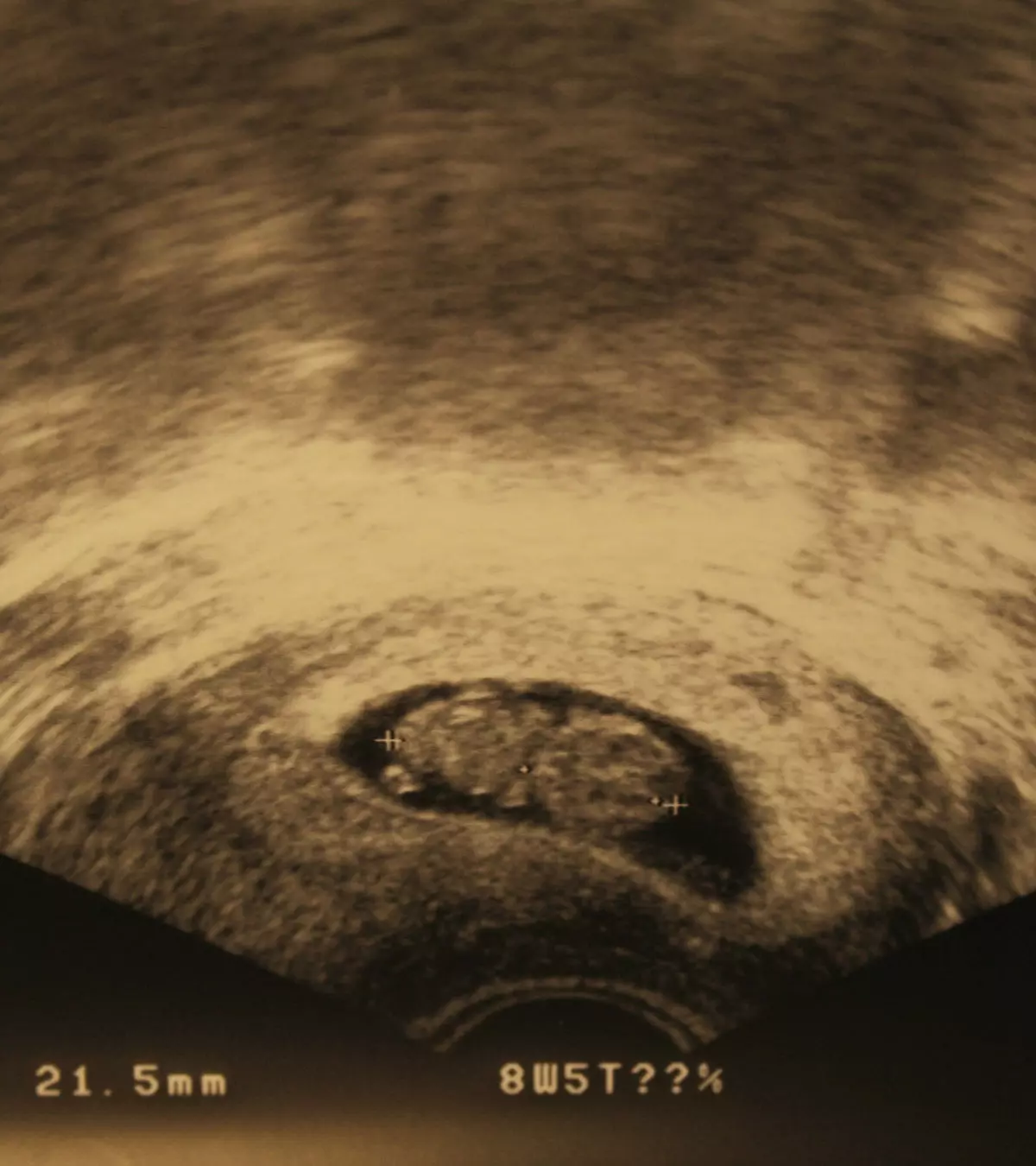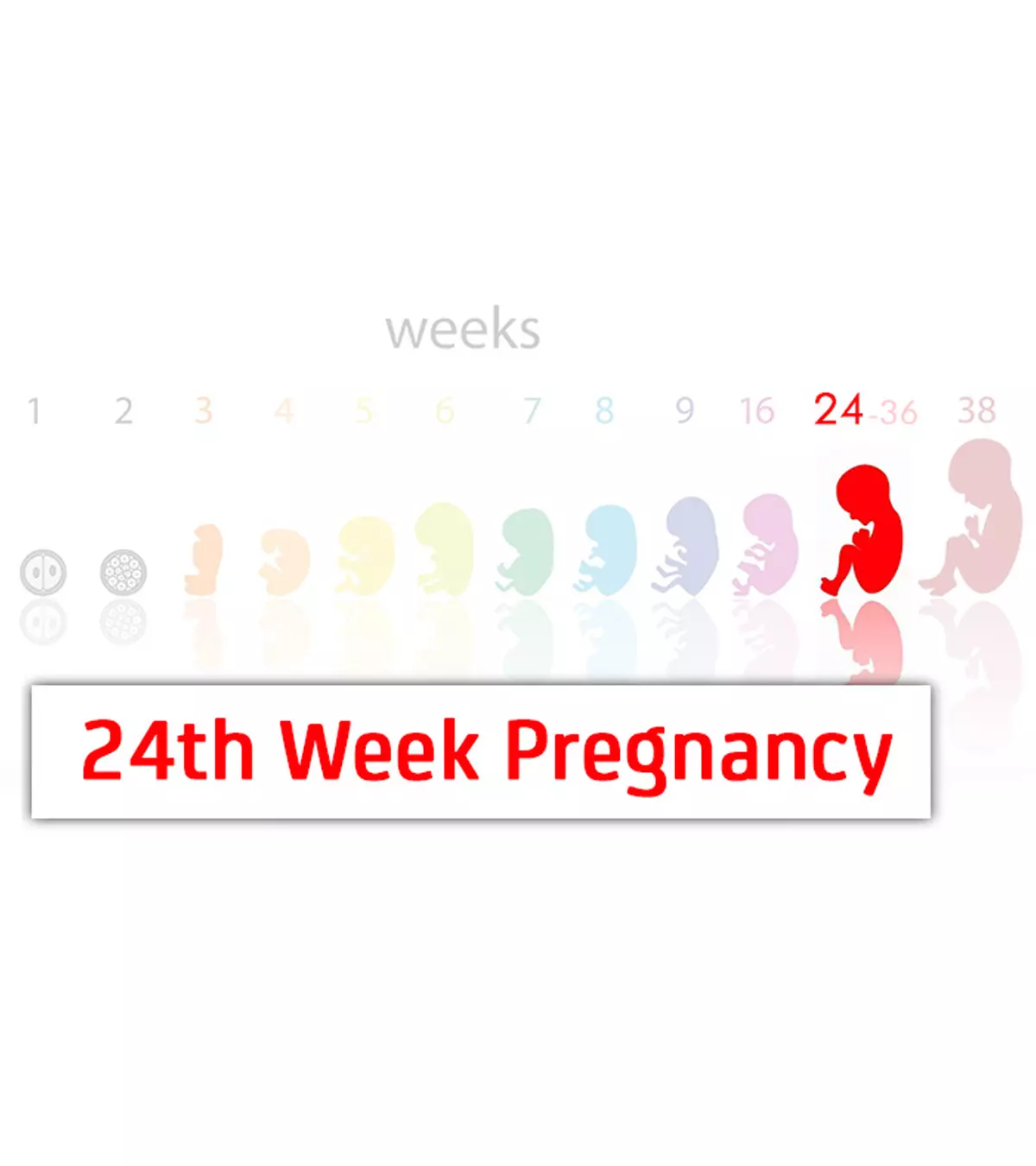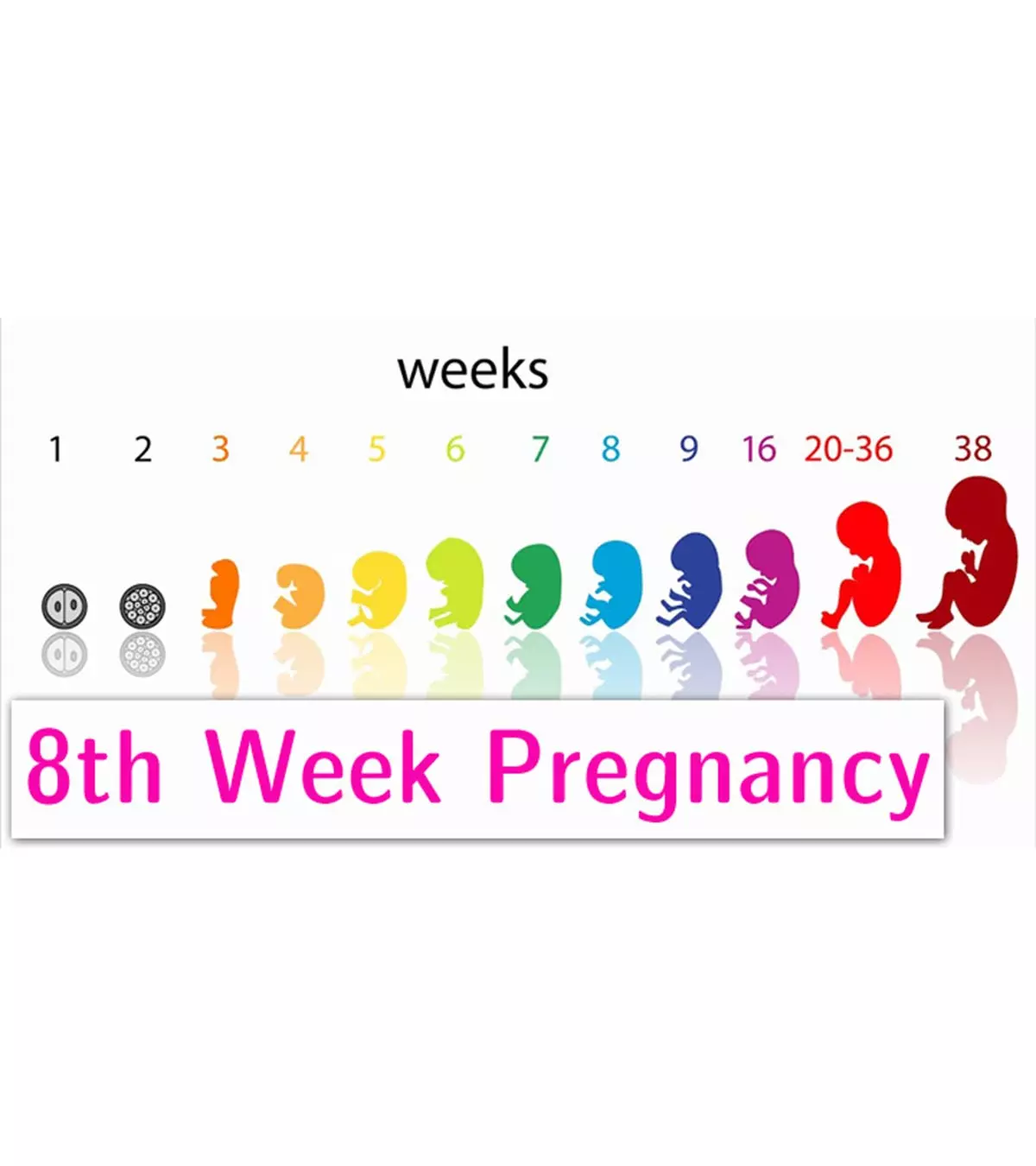
Image: Shutterstock
Key Pointers
- At 8 weeks, fetus measures 1.1-1.4cm and weighs 0.035oz
- Development of head, eyes, limbs, and organs continues
- Abdominal cramps or bleeding may signal miscarriage
- Hormonal fluctuations can cause nausea, vomiting, tender breasts, fatigue, frequent urination, and appetite changes in women.
How Many Months Pregnant Are You At 8 Weeks?
At eight weeks, you are two months pregnant.
Momjunction throws light on fetal development, pregnancy tests, and prenatal care tips you can follow during this week of the first trimester.
How Big Is Your Baby In This Week?
At eight weeks, your baby is about the size of a cranberry bean (1). Babies usually measure around 0.62in (1.1-1.4cm, measured from crown to rump) and weigh less than 0.035oz (1g) (2).
 Did you know?
Did you know?Baby Development At 8 Weeks Pregnancy
Here is how the baby’s body parts are developing in this week:
| Body parts | Developments |
|---|---|
| Eyes (3) | Begin to form with pigmentation of the retina |
| Limbs (4) | Growing longer. In hands digital rays are developed, feet look like plates. |
| Brain | Developing |
| Lungs | Start to form |
| Head (5) | Disproportionately large, can be differentiated from abdomen |
| Heart (6) | Four chambers are developed |
| Spine | The vertebral column is developed |
| Nervous system | Electrical activities start inside the brain and the nervous system |
| Umbilical cord | Blood is pumped to the embryo through it |
| Genitals | Genital buds begin to form |
While the baby grows inside of you, your body undergoes several changes as well.
Symptoms Of Pregnancy At 8 Weeks
Here is what happens to your body during the eighth week of pregnancy:
- Weight gain: One may gain about one to five pounds in the first trimester of pregnancy, and some women do not gain any weight at all (7).
| BMI | Less than 25 | Between 25-30 | More than 30 |
|---|---|---|---|
| Weight gain | 1kg | 0-1kg | 0-1kg |
- Fatigue: As the body works harder to nourish the embryo, you will start feeling tired and need more rest.
- Morning sickness: The increased level of hormones in the body can make you feel queasy.
- Food aversions and cravings: Due to hormonal fluctuations, you may develop food cravings during pregnancy as well as aversion towards certain foods.
 Quick fact
Quick fact- A heightened sense of smell: You’ll become more sensitive to certain smells, which can cause nausea too.
- Leg cramps: Leg cramps at night time are quite common. Drinking a lot of water and stretching the legs can help relieve this discomfort.

- Constipation: The progesterone hormone relaxes the gastrointestinal tract, slowing down digestion. Taking more fiber (but not too much) can help prevent constipation during pregnancy.
- Bloating: Due to the fluctuations in the hormonal levels, the digestion process is slowed down, resulting in the formation of gas. Excessive secretion of saliva, pain in thumb and index figure, and dizziness can be seen.
- The placenta is preparing to facilitate the delivery of nutrients and oxygen to the developing fetus (8).
Some women may have sudden changes and different experiences. A mother of an IVF baby shares her experience of a phantom period that occurred during the eighth week of her pregnancy. She describes, “Halfway through week eight of pregnancy, all my pregnancy symptoms disappeared. Overnight, nausea and sore breasts faded away, and they haven’t returned. On Wednesday, I had light cramps, low down in the center. It was a continuous mild pain throughout the day. Since then, the cramps have been intermittent throughout each day. On three occasions this week, I’ve had light pink spotting. My emotions became more frazzled. Essentially, everything that normally happens when my period is due has happened (i).”
Changes In The Body In The 8th Week Of Pregnancy

Following are some noticeable external changes that usually happen at this time:
- Tender breasts
- Women who already have children can show up the bump early as the abdominal muscles get stretched in the previous pregnancies.
- Weird dreams are normal owing to the many thoughts you have at this time.
- Anxiety
When To Call The Doctor
If you experience any of these symptoms, see a doctor.
- Painful uterine contractions
- Bleeding through vagina
- Watery fluid through vagina
Ectopic pregnancy
The symptoms of an ectopic pregnancy can be similar to those of a normal pregnancy.
However, the signs get distinct as days pass (9). According to the data by Global Burden of Disease (GBD), 6.69 million cases of ectopic pregnancies were reported globally in 2019.
- Light vaginal bleeding
- Nausea and vomiting
- Abdominal pain and cramps
- Weakness
Miscarriage

The symptoms of miscarriage may include (10):
- Bleeding in early pregnancy: brown discharge, bright red spotting or blood clots
- The tissues are sloughed off through the vagina
- A gush of pink vaginal fluid
- Abdominal pain or cramps
- The early pregnancy symptoms start to disappear slowly
If you experience any of these symptoms, set up an initial visit to the doctor for a checkup, recommends the experts at the American Pregnancy Association. Read on to know what your first OB appointment entails.
How To Prepare For The First OB Appointment?
For your first OB/GYN visit:
- Carry all the medical records that include the medications and supplements you are taking. The doctor can accordingly advise you to continue or stop the medications.
- Make a note of the LMP (last menstrual period). It helps in calculating the due date. If you have irregular periods or forget the date, then the doctor will go for an early scan to determine the gestational age.
- Make a list of the questions you have and get all your doubts cleared. Also talk about any concerns about the pregnancy, especially if you have had complications in the previous one.
Read on to know more about the visit to the OB/GYN.
Your OB/GYN Visit

A checkup in this week will include:
- Blood test to check for glucose, hemoglobin, blood group of the partner and patient.
- Urine test to check for proteins
- Viral markers
- Blood pressure
- Weight
- Ultrasound scan: An early 8th week ultrasound scan also called a viability scan or dating scan may be advised by the doctor to see if the pregnancy is proceeding properly. It helps:
- To locate the gestational sac inside the uterus and to rule out any chances of ectopic pregnancy.
- Check pregnancy viability by checking the fetal heartbeat or heart rate
- Check the gestational age
- Confirm singleton or multiple pregnancies
- Check for hemorrhage in case of any pain, bleeding mentioned by the patient
Your obstetrician will also ask you about specific health issues and recommend further tests if necessary. It is important that you follow a healthy diet and lifestyle during this vulnerable period.
Tips To Follow

Here are some tips you must follow:
- Eat small meals at regular intervals, avoid uncooked, spicy, deep-fried, and fatty foods.
- Drink a lot of water to keep yourself hydrated.
- Avoid strenuous exercises, sleep for at least eight hours a day.
- Take good dental care, proper bathing, and change clothes everyday.
- You may have nibble crackers before getting up from bed in the morning to ease morning sickness.
- Follow a healthy diet, which includes lean meat, cereals, dairy products, fresh and natural foods (fruits and vegetable).
- Avoid caffeine and alcohol.
- Don’t skip meals or lie down immediately after having meals.
- In the case of nausea, drink lemonade or eat watermelon or sniff a lemon.
- Chewing ginger can help relieve nausea.
- Listen to calm music, keep high self-esteem, and communicate with the unborn baby.
- Take prenatal vitamin supplements (folic acid, vitamin B6) daily in the prescribed doses.
If you have any concerns and discomforts, talk to your partner about it and consult a doctor if necessary.
- Avoid extreme chemical treatments of hair.
- Avoid taking medicines without your doctor’s permission.
- Avoid raw pineapple and papaya
Your partner can also pitch in to make you feel better during this week. Find out how next.
Tips For Dad-to-be
Here is what your partner can do:
- Accompany you to the prenatal visits.
- Help with daily household chores.
- Go for a walk or accompany you during light exercises.
- Plan for the baby’s room or how to prepare for the little one’s arrival.
- Go shopping for maternity wear.
- Avoid arguments with your partner.
Frequently Asked Questions
1. Can the fetus feel pain at eight weeks?
Studies have shown that the fetus can feel pain by the 12th week of gestation but not before that (11).
2. How much is the risk of miscarriage at eight weeks?
According to a study, the risk of having a miscarriage during the eighth week of gestation is around 1.5% (8).
3. Is it normal to experience spotting or cramping during the 8th week of pregnancy?
Yes, light spotting and mild cramping is normal during the 8th week of pregnancy. However , if the bleeding or cramping are more than mild, contact a medical health professional immediately (8).
4.What should I do if I experiences any concerning symptoms or complications during the 8th week of pregnancy?
Any symptoms that are not normal and concerning during the 8th week of pregnancy should be given immediate medical attention for the safety of the mother and the fetus.
Your baby will be approximately the size of a cranberry bean by the 8th week of pregnancy, and their heart chambers and spinal column will be fully developed. Your body will also undergo various physical and emotional changes due to the growing baby inside you. It’s also about time to prepare for your first doctor’s appointment and prenatal testing. Since you are in the early stages of pregnancy, you should be extra cautious and adhere to your doctor’s advice. If you feel any discomfort, uterine contractions or vaginal bleeding, or discharge, immediately contact your doctor.
Infographic: Allaying Your Fear Of Miscarriage At 8 Weeks Pregnancy
It is not unusual for women to have apprehensions about the safety of pregnancy and the probability of miscarriage in early pregnancy. Check out the practical tips in this infographic to get relief from your anxiety. Illustration: Momjunction Design Team
Illustration: Symptoms Of 8th Week In Pregnancy Baby Development And Tips

Image: Dall·E/MomJunction Design Team
Week 8 of pregnancy is a crucial period marking the second half of the first trimester. Learn more about your baby’s development and how to take care of yourself in this informative video.
Personal Experience: Source
MomJunction articles include first-hand experiences to provide you with better insights through real-life narratives. Here are the sources of personal accounts referenced in this article.
1. Eight weeks pregnant: enter the phantom period;https://mum100.wordpress.com/2016/11/27/eight-weeks-pregnant-enter-the-phantom-period/
References
- Week By Week Fetus Size Demonstrated By Fruits.
https://epaoa.org/week-by-week-fetus-size-demonstrated-by-fruits/ - Fetal Development.
https://embryology.med.unsw.edu.au/embryology/index.php/Fetal_Development - Pregnancy Calendar: Week 8.
https://kidshealth.org/en/parents/week8.html - Fetal Development.
https://medlineplus.gov/ency/article/002398.htm - Pregnancy – Week By Week.
https://www.betterhealth.vic.gov.au/health/healthyliving/pregnancy-week-by-week - Fetal Growth And Development.
https://doh.sd.gov/media/bnemplje/fetal.pdf - How much weight should I gain during pregnancy?
https://www.acog.org/womens-health/experts-and-stories/ask-acog/how-much-weight-should-i-gain-during-pregnancy - Week 8
https://www.nhs.uk/start-for-life/pregnancy/week-by-week-guide-to-pregnancy/1st-trimester/week-8/ - Ectopic pregnancy
https://www.nhs.uk/conditions/ectopic-pregnancy/ - Symptoms & Signs of Miscarriage
https://americanpregnancy.org/getting-pregnant/pregnancy-loss/signs-of-miscarriage/ - Fact Sheet: Science of Fetal Pain
https://lozierinstitute.org/fact-sheet-science-of-fetal-pain/ - Miscarriage
https://www.nationwidechildrens.org/conditions/health-library/miscarriage - Food Aversion
https://my.clevelandclinic.org/health/diseases/22948-food-aversion
Community Experiences
Join the conversation and become a part of our nurturing community! Share your stories, experiences, and insights to connect with fellow parents.
Read full bio of Dr. Karla S. Sanchez-Banos
Read full bio of Sakshi Mishra
Read full bio of Rebecca Malachi
Read full bio of Aneesha Amonz











